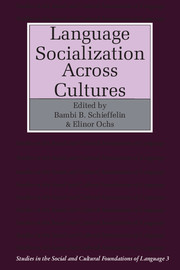Book contents
- Frontmatter
- Contents
- List of contributors
- 1 Introduction
- Part I Acquiring language and culture through interactional routines
- 2 Calling-out and repeating routines in Kwara'ae children's language socialization
- 3 Prompting routines in the language socialization of Basotho children
- 4 Interactional routines as cultural influences upon language acquisition
- 5 What no bedtime story means: narrative skills at home and school
- Part II Acquiring knowledge of status and role through language use
- Part III Expressing affect: input and acquisition
- Index
4 - Interactional routines as cultural influences upon language acquisition
Published online by Cambridge University Press: 05 June 2012
- Frontmatter
- Contents
- List of contributors
- 1 Introduction
- Part I Acquiring language and culture through interactional routines
- 2 Calling-out and repeating routines in Kwara'ae children's language socialization
- 3 Prompting routines in the language socialization of Basotho children
- 4 Interactional routines as cultural influences upon language acquisition
- 5 What no bedtime story means: narrative skills at home and school
- Part II Acquiring knowledge of status and role through language use
- Part III Expressing affect: input and acquisition
- Index
Summary
Introduction
We wrote this paper as an introduction to the symposium in which a number of the papers herein were presented. In it we intended to propose three hypotheses. The first is that children learn language in the process of interacting with others in patterned ways. We believe that the papers in this volume provide abundant evidence for the plausibility of this hypothesis. Secondly, we wanted to go further by suggesting that interactional routines facilitate the child's perception, analysis, and practice of utterances. Here we have offered examples in order to illustrate how such linkage may occur. Finally, we suggest that culturally formulated ways of communicating motivate both linguistic and social development: that in learning how to speak appropriately a child learns both language and social rules.
This paper is motivated by the belief that we need an account of language acquisition that does not avoid the question of learning. In particular, we want to be able to portray the processes of language learning so as to show how the learner's systems evolve rather than just to describe static stages. We also want to account, if possible, for the motivation that produces language development. We believe that cross-disciplinary research is needed in order to provide such an account. This is because socialization and language learning are closely intertwined. Socializing situations occur fairly predictably as to time, place, participants, and desired outcomes, all of which greatly facilitate language learning.
- Type
- Chapter
- Information
- Language Socialization across Cultures , pp. 80 - 96Publisher: Cambridge University PressPrint publication year: 1987
- 7
- Cited by



